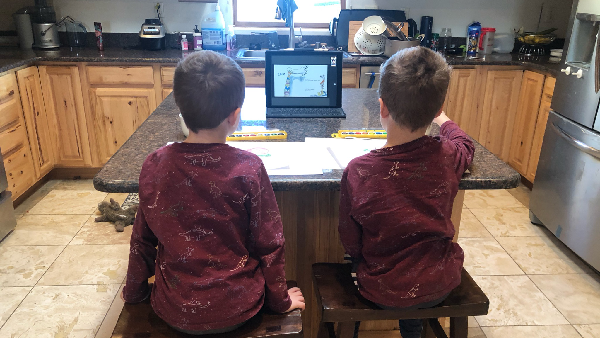Episode 15: An Unexpected Gift: Family Engagement and Coaching in Virtual Preschool and Beyond
Preschool teacher Rebecca Vitelli describes how increased family engagement and coaching have become silver linings during the pandemic. Additional insights are shared by Maryann Koziol, Rebecca's instructional coach, Katrina Daniels, the school principal, and Phally, a parent of a child in Rebecca's class. (11 min.)
Facilitator Guide
- Early Care and Education Environment Indicators and Elements of High-Quality Inclusion: E1: Promotion and Affirmation of Individual Differences, E2: Family Partnerships
- DEC Recommended Practices: Family
As you watch this episode, take note of the strategies Rebecca used to turn the struggles of remote learning into opportunities to build positive and lasting relationships with families through coaching.
Reflection Questions
- Rebecca Vitelli reflects upon and refers to family engagement and coaching as "a positive and a gift" of teaching preschool during the pandemic. How have you intentionally connected, problem-solved and checked in with families? What has been your "positive and gift" during those interactions? In what ways did this video connect to your own experiences as an educator during the pandemic?
- While reflecting, Rebecca Vitelli shared that she began to shift her expectations while building closure connections with families. More importantly, she began to learn about each student's family. This led to her operating with an affirmative attitude and appreciation for each family by acknowledging that there are multiple and valid ways of thinking, behaving and learning. What are some things you do to show families that you value both the people they are and the knowledge they have? Take a moment to reflect on some ways you might demonstrate deficit-based thinking about families-possibly without even realizing it? Identify one way you will begin to shift to a strengths-based approach?
- Phally, Alia's mother, shared that remote learning opened up a new world for parent-teacher relationships. She feels her input and concerns are being addressed, and she is an active part of Alia's education. How can you ensure that families like Alia's can be an active part of their children's education? How do your interactions reflect (or not reflect) family partnerships and equip families to support their children's learning?
- Rebecca shared her thoughts about how the pandemic pushed parent involvement and coaching to the forefront and her hope for it remaining there. What are your hopes for parent involvement when students return to in-person learning? Which of your strengths do you believe will help you achieve this? How will you use that strength to encourage and facilitate meaningful connections with families?
Group Activity
Family Engagement Strategies for Children with IFSP/IEP Goals
During the video, Rebecca shared that a bright spot of preschool during the pandemic has been the opportunity to form meaningful relationships with families. She reflected that the experience presented ways that teachers could share strategies with families for the benefit of their children, and that the one-on-one time together made it possible for parents to be true partners in their children's education. Acknowledging the fact that many parents are stretched thin and can't contribute as much as they would like, Rebecca also found a willingness of many parents to be coached on ways that they could support their children at home to work toward IFSP/IEP goals. She gave the example that the simple act of writing a grocery list can serve as a learning opportunity for the child who is working on language or communication skills. "We need apples. Oh! What is the first letter in the word apples?" What are some other examples for how teachers might coach families in this way?
Small Group Activity: Divide up into groups of two to three people. Ask each group to consider this question and brainstorm at least three examples for how teachers might coach families so that they may support their children with IFSP/IEP goals at home during typical routines. Think about the five developmental domains (physical, cognitive, social/emotional, language/communication and approaches to learning) to consider the different goals various children may have.
Return to the large group and share examples.
Facilitator note: Capture the examples in a padlet or a whiteboard. This collection of examples can then be used later by participants in their own professional work with families.

